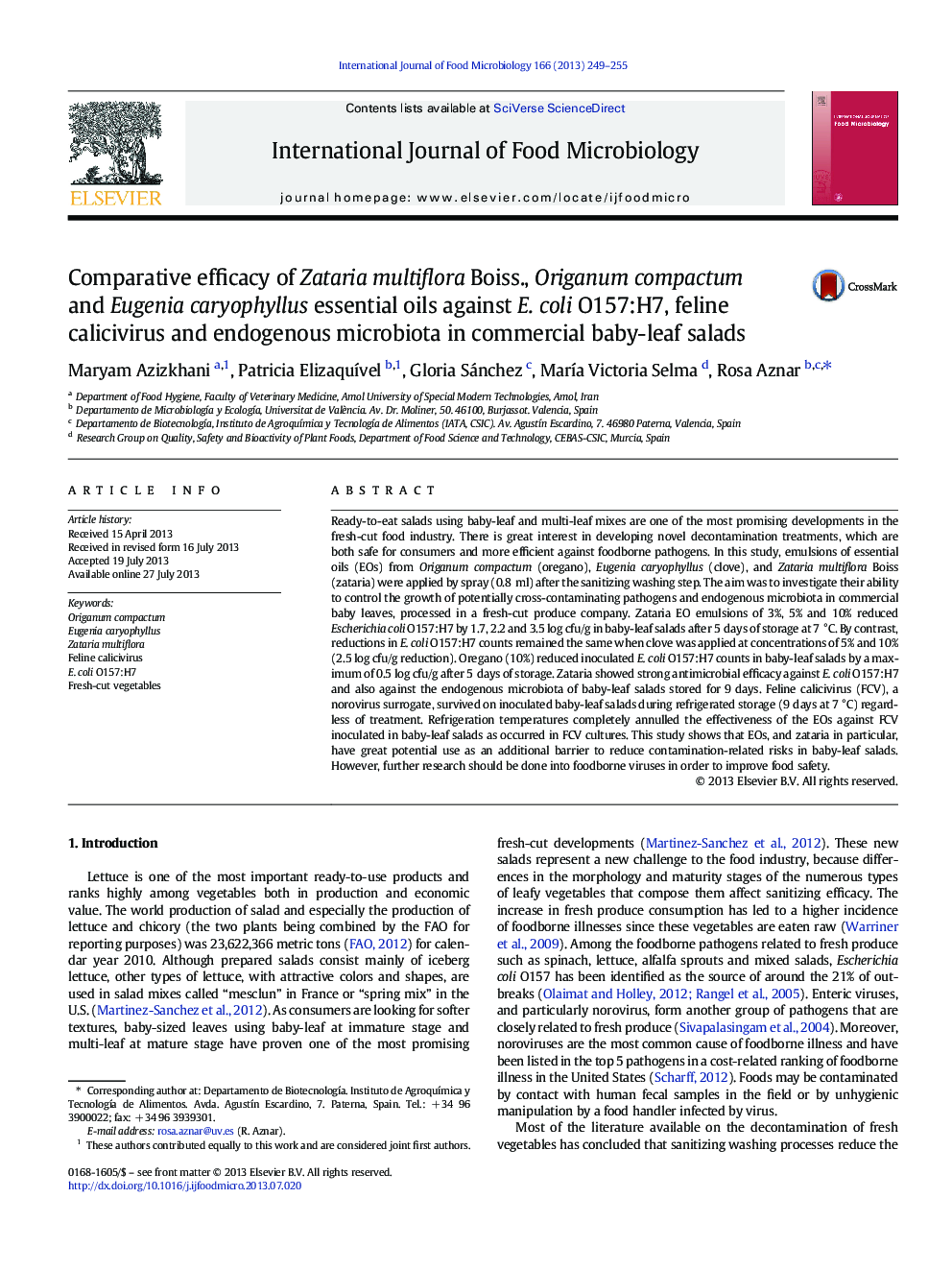| کد مقاله | کد نشریه | سال انتشار | مقاله انگلیسی | نسخه تمام متن |
|---|---|---|---|---|
| 6290148 | 1616618 | 2013 | 7 صفحه PDF | دانلود رایگان |
عنوان انگلیسی مقاله ISI
Comparative efficacy of Zataria multiflora Boiss., Origanum compactum and Eugenia caryophyllus essential oils against E. coli O157:H7, feline calicivirus and endogenous microbiota in commercial baby-leaf salads
دانلود مقاله + سفارش ترجمه
دانلود مقاله ISI انگلیسی
رایگان برای ایرانیان
کلمات کلیدی
موضوعات مرتبط
علوم زیستی و بیوفناوری
علوم کشاورزی و بیولوژیک
دانش تغذیه
پیش نمایش صفحه اول مقاله

چکیده انگلیسی
Ready-to-eat salads using baby-leaf and multi-leaf mixes are one of the most promising developments in the fresh-cut food industry. There is great interest in developing novel decontamination treatments, which are both safe for consumers and more efficient against foodborne pathogens. In this study, emulsions of essential oils (EOs) from Origanum compactum (oregano), Eugenia caryophyllus (clove), and Zataria multiflora Boiss (zataria) were applied by spray (0.8 ml) after the sanitizing washing step. The aim was to investigate their ability to control the growth of potentially cross-contaminating pathogens and endogenous microbiota in commercial baby leaves, processed in a fresh-cut produce company. Zataria EO emulsions of 3%, 5% and 10% reduced Escherichia coli O157:H7 by 1.7, 2.2 and 3.5 log cfu/g in baby-leaf salads after 5 days of storage at 7 °C. By contrast, reductions in E. coli O157:H7 counts remained the same when clove was applied at concentrations of 5% and 10% (2.5 log cfu/g reduction). Oregano (10%) reduced inoculated E. coli O157:H7 counts in baby-leaf salads by a maximum of 0.5 log cfu/g after 5 days of storage. Zataria showed strong antimicrobial efficacy against E. coli O157:H7 and also against the endogenous microbiota of baby-leaf salads stored for 9 days. Feline calicivirus (FCV), a norovirus surrogate, survived on inoculated baby-leaf salads during refrigerated storage (9 days at 7 °C) regardless of treatment. Refrigeration temperatures completely annulled the effectiveness of the EOs against FCV inoculated in baby-leaf salads as occurred in FCV cultures. This study shows that EOs, and zataria in particular, have great potential use as an additional barrier to reduce contamination-related risks in baby-leaf salads. However, further research should be done into foodborne viruses in order to improve food safety.
ناشر
Database: Elsevier - ScienceDirect (ساینس دایرکت)
Journal: International Journal of Food Microbiology - Volume 166, Issue 2, 2 September 2013, Pages 249-255
Journal: International Journal of Food Microbiology - Volume 166, Issue 2, 2 September 2013, Pages 249-255
نویسندگان
Maryam Azizkhani, Patricia ElizaquÃvel, Gloria Sánchez, MarÃa Victoria Selma, Rosa Aznar,